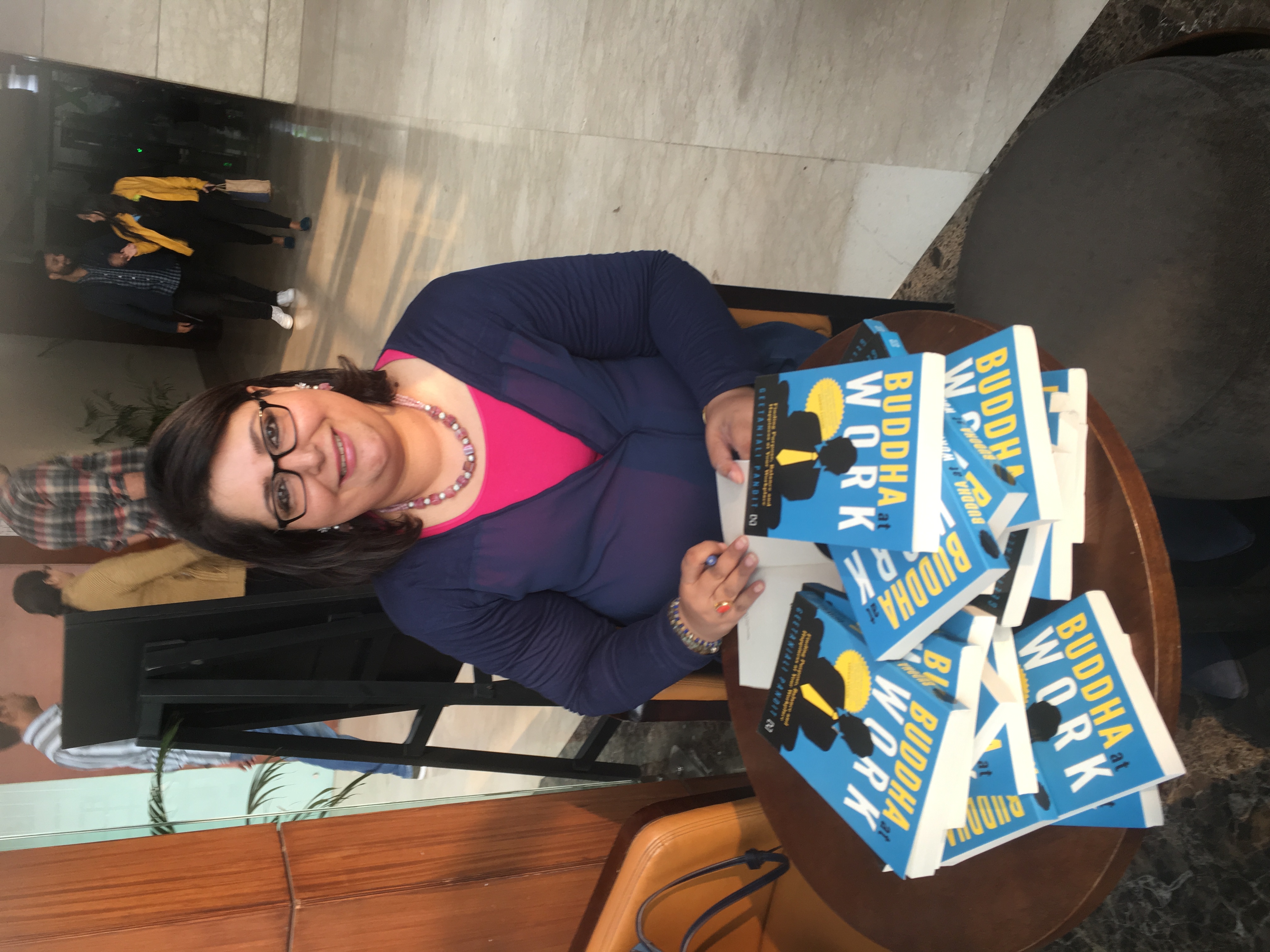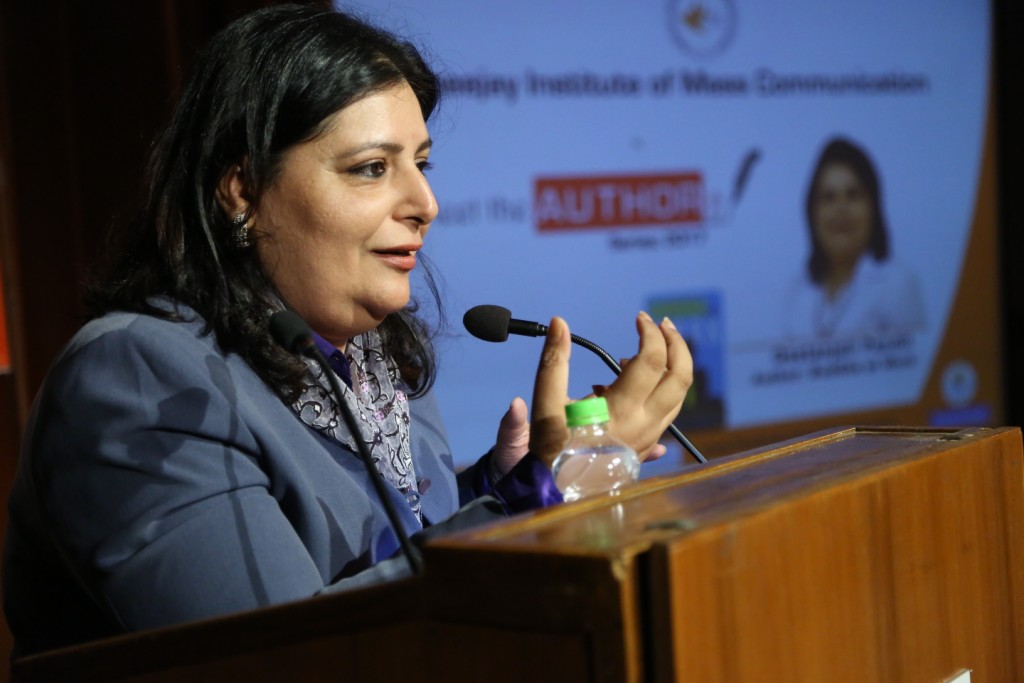Human resources professional and life coach Geetanjali Pandit speaks about why learning to control the mind is key to knowing yourself. She recently authored Buddha At Work, a bookon spirituality as an anchor to eradicate stress from one’s life. The book is available to readers in Australia and New Zealand since September 2018, it releases in the United Kingdom in January 2019, by mid-2019 in Bulgaria, in September 2019 in the United States, in Canada and in the Philippines. It will also be available in Marathi by January 2019.
Thrive Global India: Tell us about your book Buddha at Work. What inspired you to write it?

Geetanjali Pandit: My inspiration to write Buddha At Work began when a certain way of life, the practice of Buddhism (specifically Nichiren Daishonin’s Buddhism) saved my life (figuratively and perhaps even literally) in the year 2000. It was my watershed moment of starting a new journey in life. At that time, of course, I had no thought of writing this book.
In today’s world we so sceptically witness the dramatic, airbrushed, Photoshopped “Before and After” of fitness, cosmetic and health products that all of us have become closed to the possibility of dramatic transformation that is real and possible.
Well, the principles of Buddhism are clear that from the utter shambles of life and profession, new beginnings can happen with the right views, right perception and right effort. A transformation is possible with the right attitude. A sharp 180 degrees is realistic and very much possible. With this understanding and the encouragement of others, hope returned to my life.
So from the helplessness of continued unemployment, I got my first professional breakthrough with a wonderful consulting firm and there really was no looking back for the next decade as I toiled hard to catch up with life and with lost professional time. I could attract, nurture and sustain opportunities as they came up. Essentially because I was changing from within.
As a human resource professional, I had a window into all the pains, challenges and frustrations that plague people at work. I started understanding from my vantage point everyone’s struggle, their hard work, their whining and bitching, their huge stress and even their politics.
My conclusion?
Simply this: A vast majority of employees totally suffer their work their entire working life. Oh sure, the increment, the job change, a foreign visit, the promotion, that bonus all bring happiness. But since these are occasional episodes in the ‘general drama of pain’ the story of suffering continues and does not necessarily find its happy ending.
My second observation was that though everyone had a job, they were looking out almost always for the next opportunity to give them something more. Something that would make them happy. Something else that would be professionally more satisfying but always something else and of course, somewhere else.
Those who are without a job suffer on account of unemployment. They strive and struggle in the belief that the job will bring an end to their saga of difficulties. But since the job and organisation are always less than perfect, this honeymoon ends pretty fast.
And yet, I saw and realised that some people are happy, have a fair degree of satisfaction, a great degree of success. What sets them apart from the suffering majority, I wondered?
So many of them had a great attitude, some had phenomenal people skills, most of this minority had optimism and resilience and just the right way of looking at people, situations, money, targets and problems. Wisdom, if you will. A wonderful approach.
This healthy, happy minority was using principles whether consciously or unconsciously. I had myself used some of these to make a successful comeback to the corporate sector. Principles I had learnt from my study and understanding of Buddhism.
So the inspiration for Buddha At Work was really my very keen desire to reach out and share what I knew, what I had experienced and later on researched. To enable people to find purpose, balance and happiness at their place of work.
TGI: What role does spirituality play in reducing stress in the workplace and life?
GP: It is so wonderful that you ask about spirituality and not a single faith. Because spirituality transcends any single religion, sect or school. Spirituality is truly the right way of responding to life and to people. This becomes possible with the right set of beliefs in our life. In turn, beliefs shape understanding and the interpretation we lend to life. This interpretation shapes our behaviour, the outward response or reaction.
Since so much of my recent research was into the life of the Gautama Buddha, it is relevant for me to state that the Noble Eightfold Path that the Buddha espoused and propagated is truly just a code for leading a wonderful and happy life. It is about making a conscious, deliberate effort to do the right thing. Doing the right thing is possible only when the understanding, the belief and intent are right. In a way, we then choose to respond appropriately.
Stress in any person’s life, work-related or otherwise, is about that individual’s unique interpretation of events, of interactions and situations. Even the happiest of events can cause stress—people are very stressed about the happy events of their marriage, of buying a new home and of course, about shifting cities or finding a new job. In and of itself, nothing induces stress. Our past experiences and current interpretations signal our brain whether something is stress inducing or not.
The human brain is a wonderful thing but essentially makes us captive to our past experiences and the underlying beliefs of our subconscious.
When spirituality becomes a way of life, it shapes our beliefs (if we truly allow it to), it changes our interpretation to a more positive one. When the very interpretation and the impression on the physical brain changes through meditation and a few other practical techniques, stress reduces significantly. This is increasingly the subject of my workshops and something that people ask me all the time. This is also research-based. In fact, the Mayo Clinic has done some wonderful work on how meditation impacts stress.
The 13th-century Japanese sage Nichiren said, “Learn to master your mind”. This is the essence of spirituality. To master our response through the mastery of thought and belief. Else it all deteriorates into a reaction, a knee-jerk reaction to people, to events, to work and in fact, to life.
TGI: What are some of the tools and practices one can follow to ensure work-life harmony?
GP: It is wonderful that you choose to ask about work-life harmony. I am fielding the query on work-life balance all the time. Most of us tend to think that perfect multi-tasking is living in balance. Contrary to popular belief, perfect multi-tasking is actually the recipe for increasing stress and creating ill health in our body and mind.
Harmony begins with calmness. Chaos is seldom harmonious! Remaining calm and focussed create harmony. The element of ‘Mindfulness’ in daily living is the foundation of work-life harmony.
In modern life, we celebrate the doing of things to the maximum. So the popular belief of ‘work hard, party harder’ is really accepted. When you ‘work hard, party harder’ you are pushing away harmony from yourself.
Mindfulness and harmony don’t reduce pleasure and enjoyment of the same work and the party. They only increase it. They enhance it. It all begins with the right understanding and the right beliefs. A training of our life at its roots.
TGI: What is the first thing one shouldn’t do when one gets out of bed?
GP: You absolutely should not, must not touch your phone or get on to a device as soon as you wake up or get out of bed. Please do not.
Increasingly the world is grappling with addiction and addictive patterns of our devices. In particular, WhatsApp addiction is now recognised across the globe and its impact on the quality of life, work and interpersonal relationships is negative to the point of being horrific. All apps are, including games, built to be addictive. They press just the right buttons in our brain and isolate us from life. Don’t you feel irritated or upset when a family member or a colleague interrupts your device time? Hopefully, you will keep your irritation under strict check when it’s your boss!
These patterns and behaviours get carried to an extreme especially in the case of very young people.
So is to not, simply not touch any device, not log into e-mails or WhatsApp or even reach for a newspaper or switch on the telly first thing in the morning. Our mornings set the tone for the rest of the day. The brain and body are usually well rested and fresh.
This is a wonderful time to shape the rest of the day by working on the body through exercise, on the brain through puzzles and meditation, on the family by having a great breakfast together and on cutting stress by being in control of the day right from the start of it. This also will help you reach work on time and not wage an unnecessary battle with traffic.
TGI: You have over a decade of experience as the head of human resource department, what are some of the initiatives which can be introduced to promote employee well-being?
GP: Spirituality at the workplace is the key to promoting well-being. What do I mean by this? It is the underlying belief of the sanctity of each life. And therefore, the thought that each person is worthy of respect. Each life is precious. With this belief and the consequent thought, our behaviour and attitude in life and at work will change and transform. We will perceive our own work differently and this intent will lend it a higher purpose. We will treat our colleagues, seniors, juniors, vendors and of course, our clients, consumers and all stakeholders very differently.
If only more and more organisations see this truth, it will usher in a different way of doing business and lend work a significance that raises it beyond just the means to earn a living.
TGI: How do you incorporate well-being into your life?
GP: The Buddha said, “Resolutely train yourself to attain peace”.
If I could dare paraphrase this, I would say, “Resolutely train yourself to attain well-being.” Wellness and well-being are a matter of consistent training of the mind, emotions and body. Yes, it appears that some people are born well-adjusted and therefore, with an inherent sense of wellness. Yes, it is true that when our parents (and it is a matter of great good luck) are either through conscious training or as a product of their own upbringing, in a state of wellness, it is easier to simply learn through observation or as the epigenetics expert Dr Bruce Lipton states, through downloading the first seven years of our life.
No matter how tough or difficult your growing up years may have been and how far from relaxed and easy your childhood was, it is always possible to undo the damage done by consciously training the brain and changing the underlying programme to wellness.
I have found three things of great help in creating wellness in my own life.
1. Using visualisation and breathing to let go of the negative and establish that I which I want, that which I desire in the deeper recesses of my brain and therefore of my life.
2. Using meditation to slow down brain and body activity and using that little gap to instil or install the right beliefs in my life.
3. The most important point is to consciously work on having and holding on to gratitude for all that is contained in my life—all the blessings and the abundance that fills my life and brims over.
TGI: Share a quote that you love and that gives you strength or peace
GP: Well, I have many favourites! It becomes a bit difficult to choose one over the other. Let me share two of my favourite quotes from the Gautama Buddha. The first “You, yourself, as much as anybody in the entire universe, deserve your love and affection”.
The second quote that I like to mull over in my mind is also the Buddha’s. “To enjoy good health, to bring true happiness to one’s family, to bring peace to all, one must first discipline and control one’s own mind.”
Both these thoughts are so profound, so transformational if we can apply them to our lives, to our mind.
Want to share your story of how you thrive? Write to us at [email protected]
More on Thrive Global India:
Why Meditation Makes You Happy
Here’s the Formula To Reclaim Your Happy Life
India’s Thrive Journey of a Billion Steps Starts with One: Yours


